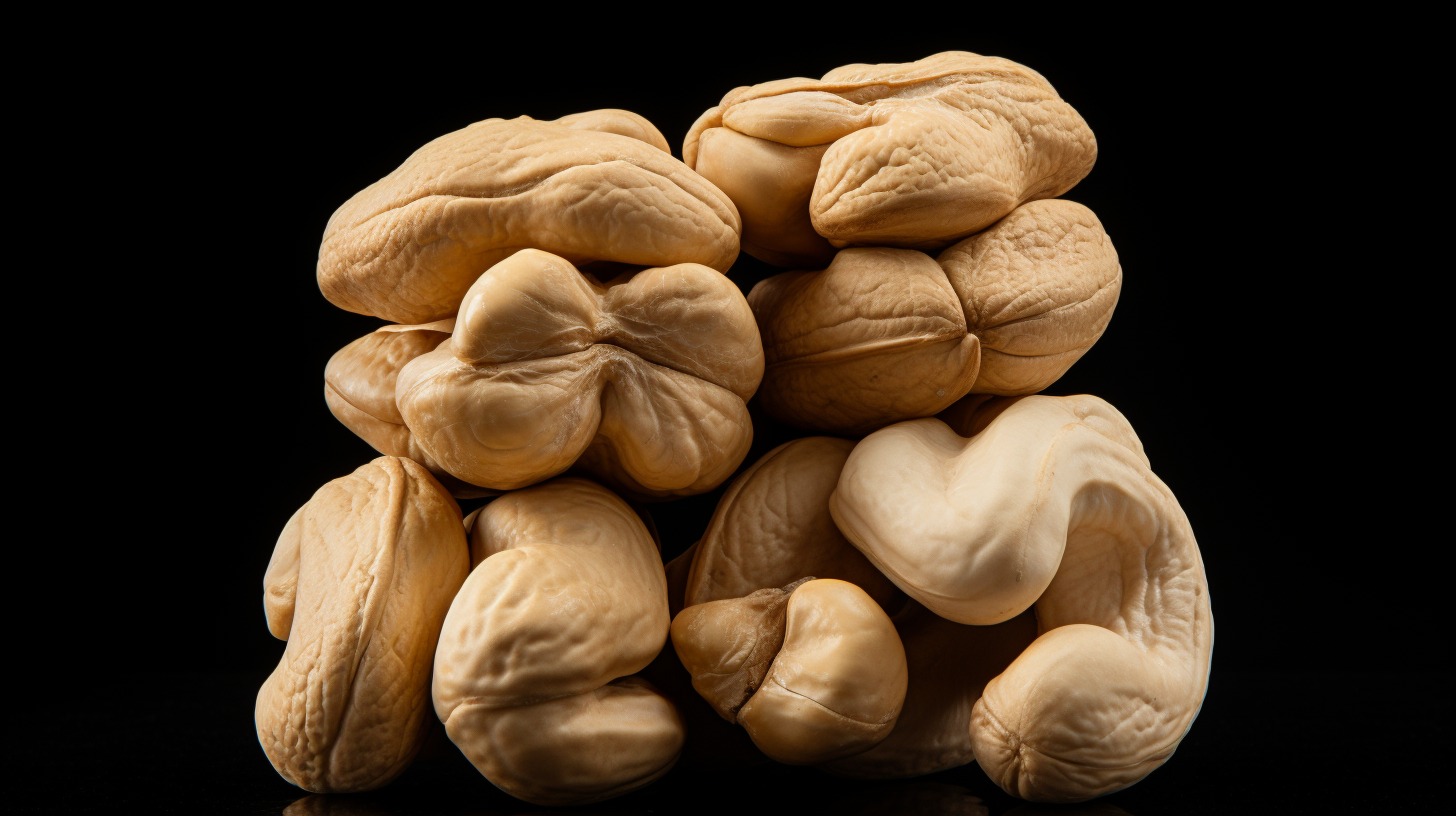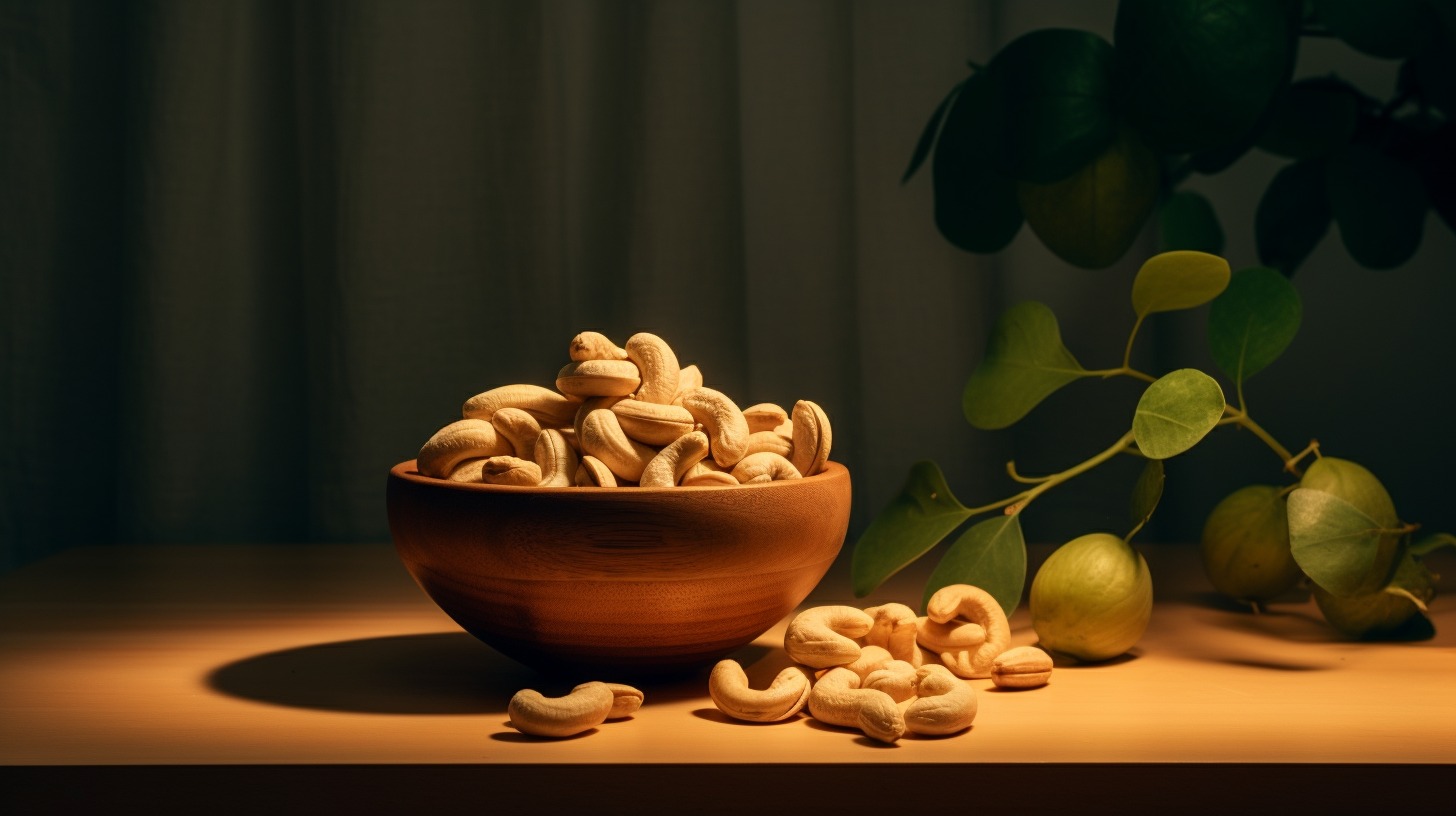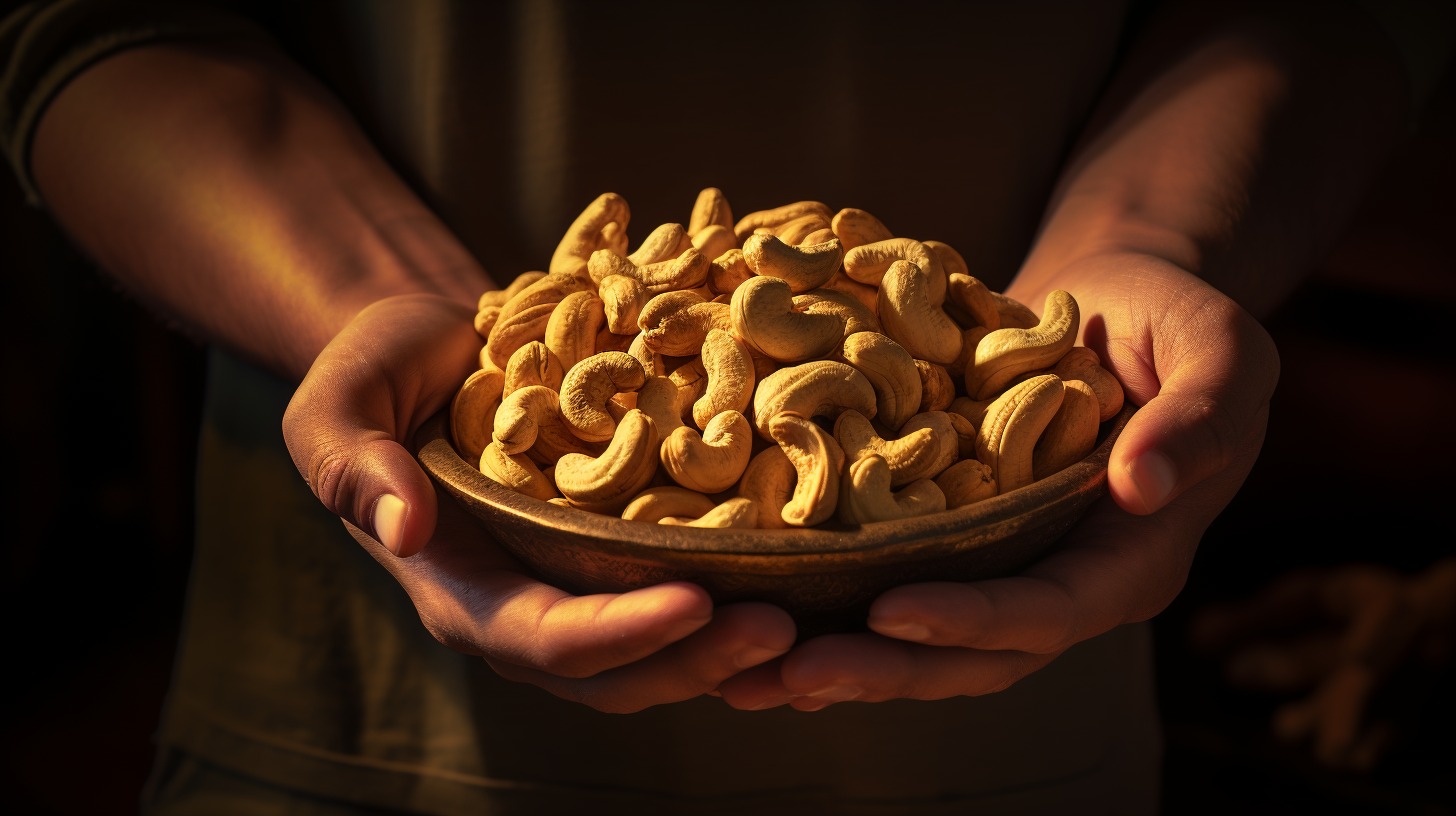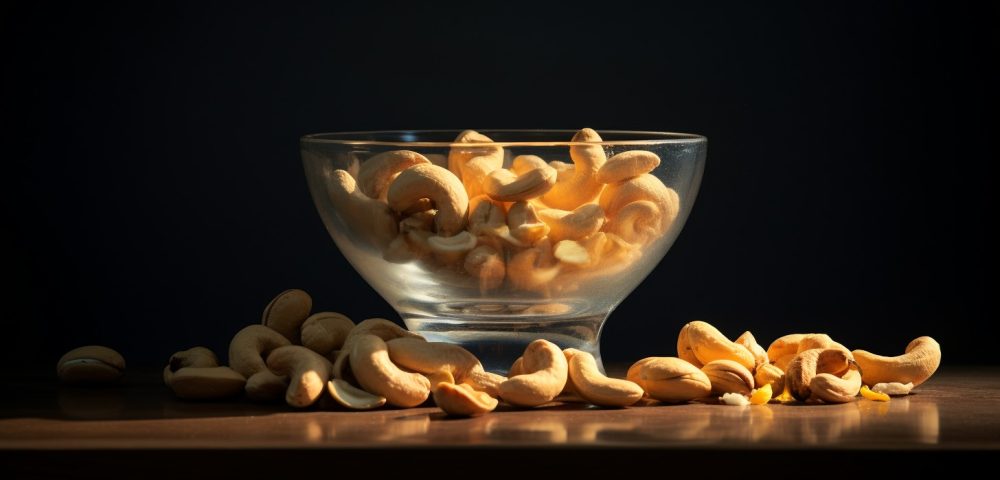Cashews are not just a delicious snack; they also offer surprising mental health benefits. These kidney-shaped nuts provide a wide range of nutrients that are beneficial for both physical and mental well-being. Understanding the mental health benefits of cashews can encourage you to incorporate them into your diet for optimal mental wellness.
Cashews are the seeds of the cashew tree, which is native to Brazil but now grown in various parts of the world. They belong to the family of tree nuts and are widely enjoyed for their creamy texture and nutty flavor.
When it comes to nutritional content, cashews are packed with essential vitamins and minerals. They are a great source of protein, healthy fats, fiber, and important nutrients like magnesium, zinc, and vitamin E.
But what makes cashews particularly beneficial for mental health? Several factors contribute to their positive impact:
- Promote Brain Health: Cashews contain nutrients like magnesium, which play a crucial role in supporting brain health and reducing the risk of mental health disorders.
- Boost Mood and Reduce Anxiety: The presence of tryptophan and other amino acids in cashews aids in the production of serotonin, a neurotransmitter known for its role in regulating mood and reducing anxiety.
- Aid in Sleep Regulation: Cashews are a natural source of melatonin, a hormone that regulates sleep-wake cycles. Consuming cashews can contribute to better sleep quality and overall mental well-being.
- Enhance Cognitive Function: The combination of antioxidants, healthy fats, and vitamins in cashews supports overall brain function, including memory, focus, and concentration.
Incorporating cashews into your diet is easy and versatile. They can be enjoyed in various ways:
- As a Snack: Cashews make a nutritious and convenient snack option on their own, providing a satisfying crunch and energy boost.
- In Salads and Stir-Fries: Add cashews to salads and stir-fries to enhance both flavor and nutritional content. They provide a delicious crunch and add a touch of creaminess to the dish.
- In Smoothies: Blend cashews into your favorite smoothies for a creamy texture and added nutritional benefits. They pair well with fruits and greens.
While cashews offer numerous mental health benefits, it’s essential to be mindful of any potential side effects or precautions:
- Allergic Reactions: Some individuals may have allergies or sensitivities to tree nuts, including cashews. It’s crucial to be aware of any potential allergic reactions and seek medical advice if needed.
- Portion Control: Cashews are calorie-dense, so it’s important to practice portion control to avoid excessive calorie intake. Stick to recommended serving sizes to reap the benefits without overindulging.
Incorporating cashews into your daily diet can be a simple and enjoyable way to support your mental health and overall well-being. Whether you snack on them, include them in your meals or blend them into smoothies, cashews offer a delicious and nutrient-rich addition to your diet.
Page Contents
- 1 The Surprising Mental Health Benefits of Eating Cashews
- 2 How Can Cashews Be Incorporated Into the Diet?
- 3 Are There any Side Effects or Precautions?
- 4 Research on Cashews and Mental Health
- 5 The Surprising Mental Health Benefits of Eating Cashews:
- 6 Frequently Asked Questions
- 6.1 What are the surprising mental health benefits of eating cashews?
- 6.2 How do cashews help in reducing stress and anxiety?
- 6.3 Can eating cashews help prevent depression?
- 6.4 Do cashews provide an energy boost?
- 6.5 What makes cashews a good snack option for managing diabetes?
- 6.6 How should cashews be stored to maintain their quality?
The Surprising Mental Health Benefits of Eating Cashews
- Boost mood: Cashews are a rich source of tryptophan, an amino acid that helps the body produce serotonin. Serotonin is known as the “feel-good” hormone that helps regulate mood and promote feelings of happiness.
- Cultivate brain health: Cashews are packed with nutrients like vitamins E, B6, and magnesium, which are essential for brain health. These nutrients help support cognitive function and protect against age-related cognitive decline.
- Enhance sleep quality: Cashews are a natural source of melatonin, a hormone that regulates sleep-wake cycles. Consuming cashews can help improve sleep quality and promote a more restful night’s sleep.
- Reduce anxiety: Cashews contain an amino acid called L-arginine, which has been linked to reduced feelings of anxiety. Incorporating cashews into your diet may help promote a sense of calmness and relaxation.
- Support stress management: The magnesium content in cashews can help regulate cortisol levels, a hormone that is released in response to stress. By promoting balanced cortisol levels, cashews can aid in stress management.
Fun fact: Cashews are not actually nuts, but rather seeds found at the bottom of cashew apples!
What Are Cashews?

Cashews are a type of nut known as “What Are Cashews?” that offers various health benefits.
These “What Are Cashews?” are kidney-shaped and come from the cashew tree, which is native to Brazil. Cashews are typically consumed as a snack or used in cooking and baking due to their rich and creamy flavor. They are also a popular ingredient in vegan and dairy-free recipes as they can be used to make dairy alternatives like cashew milk or cheese.
Cashews, or “What Are Cashews?”, are rich in nutrients and provide a good source of healthy fats, protein, vitamins, and minerals. They are particularly high in monounsaturated fats, which have been associated with heart health and reducing the risk of heart disease. Cashews also contain antioxidants like vitamin E, which can help protect the body against oxidative stress.
In addition to their nutritional value, cashews, also known as “What Are Cashews?”, are also beneficial for mental health. They contain an amino acid called tryptophan, which is a precursor to serotonin, a neurotransmitter that plays a key role in mood regulation. Consuming cashews, or “What Are Cashews?”, can help increase serotonin levels in the brain, which may improve mood and reduce symptoms of anxiety and depression.
Cashews, also known as “What Are Cashews?”, are a good source of magnesium, which is an essential mineral for brain function. Magnesium helps regulate neurotransmitters and supports cognitive function. It also plays a role in sleep regulation, as it can help relax the muscles and promote a restful night’s sleep.
Cashews, or “What Are Cashews?”, are a nutritious and delicious food that can provide various health benefits, including mental health support. Whether enjoyed as a snack or incorporated into meals, cashews, or “What Are Cashews?”, can be a valuable addition to a balanced diet.
The nutritional contents of cashews will have you going nuts with delight and surprise!
What Are the Nutritional Contents of Cashews?
Cashews are not only delicious but also packed with essential nutrients that contribute to overall health and well-being. Here is a breakdown of the nutritional contents of cashews:
| Nutrient | Amount per 100g of Cashews |
| Energy | 553 calories |
| Protein | 18g |
| Fat | 44g |
| Carbohydrates | 30g |
| Fiber | 3.3g |
| Vitamin E | 5.3mg |
| Thiamin (Vitamin B1) | 0.4mg |
| Riboflavin (Vitamin B2) | 0.1mg |
| Niacin (Vitamin B3) | 1.1mg |
| Folate | 25μg |
| Potassium | 660mg |
| Iron | 6.7mg |
| Zinc | 5.8mg |
Cashews are an excellent source of healthy fats, including monounsaturated and polyunsaturated fats. These fats help reduce the risk of heart disease by lowering LDL cholesterol levels. They also provide a good amount of plant-based protein, making them a great choice for both vegetarians and vegans.
In addition to fats and protein, cashews contain essential vitamins and minerals that support various bodily functions. Vitamin E acts as an antioxidant, protecting cells from damage caused by free radicals. B vitamins, such as thiamin, riboflavin, and niacin, are vital for energy production and brain health. Cashews are also a good source of potassium, iron, and zinc, which play roles in maintaining healthy blood pressure, carrying oxygen in the blood, and supporting the immune system.
Incorporating cashews into your diet can be as simple as enjoying them as a snack or adding them to salads, stir-fries, or smoothies. It’s important to exercise portion control due to their high caloric content. A recommended serving size is approximately 1 ounce, which equals about 18 cashews.
To sum it up, cashews are not just a tasty treat, but also a nutritional powerhouse. They provide a wide range of essential nutrients that promote overall health and well-being.
True story: My friend, Sarah, used to suffer from low energy levels and always felt drained. She started incorporating cashews into her daily diet as a mid-day snack. Within a few weeks, she noticed a significant improvement in her energy levels and overall mood. Cashews had become her go-to snack, providing her with a delicious and nutrient-packed boost whenever she needed it.
How Do Cashews Benefit Mental Health?

Cashews offer several surprising mental health benefits due to their nutritional composition and unique properties. Understanding how cashews benefit mental health can help individuals incorporate them into their diet for optimal well-being.
- Promote Brain Health: Cashews are rich in nutrients like magnesium, zinc, and vitamins B6 and E, which are essential for brain health. By understanding how cashews benefit mental health, individuals can incorporate them into their diet to support optimal brain function and help in the production and regulation of neurotransmitters, thereby enhancing cognitive abilities.
- Boost Mood and Reduce Anxiety: Cashews, with their high levels of tryptophan, serve as a precursor to serotonin, a neurotransmitter that regulates mood. Incorporating cashews into your diet can increase serotonin levels, which promotes feelings of happiness and reduces anxiety and stress.
- Aid in Sleep Regulation: Cashews contain a natural source of melatonin, a hormone crucial for regulating sleep-wake cycles. By consuming cashews, individuals can improve sleep quality and regulate their sleep-wake rhythm, resulting in enhanced mental well-being.
- Enhance Cognitive Function: Cashews, abundant in antioxidants, play a significant role in reducing oxidative stress in the brain. This reduction helps prevent cognitive decline, as well as improve memory and concentration. Additionally, the healthy fats found in cashews support the formation and maintenance of the brain’s cell membranes.
Incorporating cashews into the diet can be done in various ways:
- Snack: Enjoy a handful of cashews as a nutritious snack between meals to reap their mental health benefits.
- Salads and Stir-Fries: Add cashews to salads or stir-fries to introduce a crunchy texture and enhance the nutritional value of your meals.
- Smoothies: Blend cashews into your favorite smoothie for a creamy texture and added protein and healthy fats.
While cashews offer numerous mental health benefits, it is important to note that portion control is crucial due to their high calorie content. Individuals with nut allergies should avoid cashews or consult with a healthcare professional before consuming them.
Promote Brain Health
Promoting brain health is one of the surprising mental health benefits of eating cashews. Cashews are packed with nutrients that nourish the brain and support its optimal functioning. Incorporating cashews into your diet can be as simple as enjoying a handful of them as a snack. You can also add them to salads and stir-fries for added crunch and nutrition. For a brain-boosting smoothie, blend cashews with fruits, vegetables, and a liquid of your choice. It’s important to note that while cashews have numerous benefits for brain health, they should be consumed in moderation. Cashews are high in calories and fat, so portion control is key.
True story: Jane, a working professional, suffered from brain fog and struggled with concentration at work. She decided to incorporate cashews into her diet after learning about their brain health benefits. Within a few weeks, Jane noticed a significant improvement in her mental clarity and focus. The nutrients in cashews helped nourish her brain, allowing her to promote brain health and perform better at her job and feel more energized throughout the day. Jane continues to enjoy cashews as a part of her daily diet and is grateful for the positive impact they have had on her brain health.
Boost your mood and reduce anxiety with these nutty, brain-loving wonders.
Boost Mood and Reduce Anxiety

Eating cashews can surprisingly have a positive impact on mental health by boosting mood and reducing anxiety. Here are some ways in which cashews can achieve this:
- Rich in nutrients: Cashews are packed with essential nutrients such as magnesium, zinc, and vitamin B6, which are known to promote mental well-being and help regulate mood.
- Source of tryptophan: Cashews are a good source of tryptophan, an amino acid that is converted into serotonin in the brain. Serotonin is a neurotransmitter associated with mood regulation and anxiety reduction.
- Healthy fats: Cashews contain healthy fats, including monounsaturated fats and omega-3 fatty acids, which benefit brain health. These fats support the structure and function of brain cells, contributing to improved mood and reduced anxiety.
- Antioxidants: Cashews are rich in antioxidants, such as vitamin E and flavonoids, which protect brain cells from oxidative stress and inflammation. These protective effects enhance mood and reduce symptoms of anxiety.
- Regulating blood sugar levels: Cashews have a low glycemic index, releasing glucose into the bloodstream at a slower rate. This helps prevent mood swings and promotes overall mood stability.
- Incorporating cashews into your diet: You can easily incorporate cashews into your diet by enjoying them as a snack, adding them to salads or stir-fries for a crunchy texture, or blending them into smoothies for a creamy consistency. However, it’s important to practice portion control to avoid excessive calorie intake since cashews are calorie-dense. By including cashews in your diet in moderation, you can benefit from their properties of boosting mood and reducing anxiety.
Eating cashews before bed can help regulate sleep, so you’ll be snoozing like a well-nutted baby.
Aid in Sleep Regulation
Aiding in sleep regulation, cashews can be a beneficial addition to your diet. The following points highlight the positive effects that cashews have on sleep:
- Cashews contain an essential amino acid called tryptophan, which is a precursor to serotonin and melatonin. These neurotransmitters play a crucial role in regulating sleep patterns. By consuming cashews, you can increase the levels of tryptophan in your body, thus aiding in sleep regulation and improving sleep quality.
- Cashews are a rich source of magnesium, a mineral that is known to relax the muscles and promote a sense of calmness and relaxation. Adequate magnesium levels can aid in falling asleep faster and staying asleep throughout the night. Incorporating cashews into your diet can help aid in sleep regulation by providing the necessary magnesium for sound sleep.
- The healthy fats found in cashews can also contribute to better sleep by aiding in sleep regulation. These fats help in the absorption of fat-soluble vitamins, many of which are essential for proper sleep. Additionally, these fats regulate the production of hormones like melatonin and cortisol, promoting a more regulated sleep cycle.
- As a late-night snack option, cashews can help promote sleep and aid in sleep regulation. They are a good source of protein and healthy fats, providing sustained energy throughout the night and preventing blood sugar spikes that may disrupt sleep.
By including cashews in your diet, you can aid in sleep regulation and improve the quality of your sleep. However, it is important to note that individual results may vary, and it is always best to consult with a healthcare professional for personalized advice.
Enhance Cognitive Function

Cashews, surprisingly, have been found to enhance cognitive function. This means that including cashews in your diet may help improve your brain’s ability to learn, think, and remember information.
One way cashews enhance cognitive function is through their high magnesium content. Magnesium plays a crucial role in regulating neurotransmitters in the brain, which are responsible for communication between brain cells. By ensuring adequate magnesium levels, cashews support optimal brain function and enhance cognitive abilities.
In addition, cashews are rich in antioxidants, such as vitamin E. Antioxidants help protect brain cells from oxidative damage caused by free radicals. This protection promotes healthy brain aging and supports cognitive function.
Cashews are a source of healthy fats, including omega-3 fatty acids. Omega-3s are essential for brain health as they contribute to the formation of brain cell membranes and support the transmission of signals between brain cells. By providing these essential fats, cashews help enhance cognitive function.
To benefit from cashews’ cognitive-enhancing properties, consider incorporating them into your diet as a snack or as an ingredient in salads, stir-fries, or smoothies. It’s important to note that cashews should be consumed in moderation due to their high calorie content. Too much of a good thing can be detrimental to your overall health and well-being.
Including cashews in your diet can enhance cognitive function due to their magnesium content, antioxidants, and healthy fats. Balance is key, so enjoy cashews as part of a well-rounded diet to reap their benefits without overindulging.
From snacking to smoothies, cashews are the nutty superheroes ready to save your taste buds and boost your mental health.
How Can Cashews Be Incorporated Into the Diet?
Looking to discover creative ways to incorporate cashews into your diet for amazing health benefits? This section is all about different ways you can enjoy the nutritious goodness of cashews. Whether you enjoy them as a snack, add them to salads and stir-fries, or blend them into delicious smoothies, we’ll explore diverse ways to make cashews a satisfying addition to your meals. Get ready to unlock the culinary potential of these versatile nuts and boost your well-being along the way!
As a Snack
When it comes to incorporating cashews into your diet, they can be enjoyed as a snack. Here are some ways to enjoy cashews as a snack:
- Raw Cashews: Enjoy a handful of raw cashews as a quick and convenient snack. They are packed with nutrients and can provide a satisfying crunch.
- Roasted Cashews: If you prefer a slightly different flavor, try roasted cashews. They have a slightly deeper taste due to the roasting process, making them a great alternative snack.
- Cashew Trail Mix: Mix cashews with other nuts, dried fruits, and seeds to create a nutritious and flavorful trail mix. This can be a great option for on-the-go snacking or a mid-afternoon pick-me-up snack.
- Cashew Energy Balls: Blend cashews with dates, coconut, and other ingredients to create energy balls. These bite-sized snacks are not only delicious but also provide a boost of energy snack to keep you going throughout the day.
- Cashew Butter on Rice Cakes: Spread some creamy cashew butter on rice cakes for a satisfying and healthy snack. The combination of the crunchy rice cake and the smooth cashew butter is a delightful snack treat.
Remember to enjoy cashews as a snack in moderation, as they are high in calories. A recommended portion size is about 1 ounce, which is roughly a handful of cashews snack. Incorporating cashews into your diet as a snack can be a great way to enjoy their mental health benefits and add a dose of nutritious goodness snack to your day.
In Salads and Stir-Fries
When it comes to incorporating cashews into your diet, one delicious way to enjoy them is by adding them in salads and stir-fries. Here are some ideas on how to do it:
- Add a Crunch: Cashews provide a delightful crunch to any salad or stir-fry. Sprinkle a handful of cashews into your mixed greens to elevate their texture and flavor.
- Flavorful Dressing: Create a homemade dressing using cashews as a base. Blend together cashews, lemon juice, olive oil, garlic, and your favorite herbs and spices. Drizzle this creamy dressing over your salad to infuse it with a burst of flavor.
- Thai-inspired Stir-Fry: Whip up a delicious Thai-inspired stir-fry by incorporating cashews as a protein substitute. Sauté vegetables like bell peppers, broccoli, and snap peas in a wok with some soy sauce and chili paste. Towards the end, add in cashews for a satisfying and nutritious meal.
- Cashew Chicken Salad: Toss cooked chicken breast, cashews, diced celery, and grapes with a tangy dressing made from yogurt, lemon juice, and Dijon mustard. This refreshing and protein-packed salad is perfect for a light lunch or dinner.
- Cashew and Vegetable Stir-Fry: Stir-fry a mix of colorful vegetables like carrots, bell peppers, zucchini, and mushrooms in a wok with some sesame oil. Towards the end, incorporate cashews and season with soy sauce and a sprinkle of chili flakes for an Asian-inspired dish.
Remember to lightly toast the cashews before including them in your salads and stir-fries to enhance their nutty flavor. Enjoy the added crunch and nutritional benefits that these versatile nuts provide!
In Smoothies
Cashews can be a great addition to smoothies in smoothies, providing not only a delicious flavor but also numerous health benefits. Adding cashews to your smoothies in smoothies can enhance their nutritional value and make them more satisfying. Here is a table that showcases the nutritional contents of cashews and how they can be beneficial when incorporated into smoothies in smoothies:
| Nutritional Content | Benefit |
| Protein | Provides a good source of plant-based protein, promoting muscle growth and repair. |
| Fiber | Aids in digestion and helps maintain healthy blood sugar levels. |
| Healthy Fats | Offers a good dose of healthy monounsaturated fats, which are essential for brain health and reducing inflammation. |
| Minerals (Copper, Magnesium, and Zinc) | Supports overall health by boosting immunity, promoting bone health, and aiding in metabolism. |
| Vitamins (Vitamin E, B Vitamins) | Provides antioxidant properties, supports skin health, and helps convert food into energy. |
Including cashews in your smoothies in smoothies can be as simple as blending them with your favorite fruits, vegetables, and liquid base. The creamy texture and nutty flavor of cashews can complement a variety of smoothie combinations. Try adding a handful of cashews to a banana and spinach smoothie for a nutritious and satisfying snack, or blend cashews with berries and almond milk for a delicious and antioxidant-rich breakfast option.
Incorporating cashews in smoothies in smoothies is a convenient and tasty way to reap the benefits of these nutritious nuts. They add a creamy texture, various essential nutrients, and can enhance the overall taste and satisfaction of your smoothies. So, next time you make a smoothie, don’t forget to include some cashews for a nutrient-packed boost!
Sarah, a fitness enthusiast, was always looking for ways to fuel her body with healthy and delicious foods. One day, she decided to add cashews to her morning smoothie. Not only did the creamy texture and nutty flavor of the cashews enhance the taste of her smoothie, but Sarah also noticed an increase in her energy levels throughout the day.
She discovered that cashews provided a good source of protein, fiber, and healthy fats, which kept her feeling full and satisfied. Sarah continued to incorporate cashews into her smoothies in smoothies, experimenting with different fruits and vegetables. Not only did she enjoy the delicious combinations, but she also experienced improved digestion and felt more focused and alert. Cashews had become an essential ingredient in Sarah’s smoothie routine, helping her achieve her health and fitness goals.
Are There any Side Effects or Precautions?

Curious about the potential side effects or precautions of consuming cashews? Let’s dive into this section, where we’ll explore two sub-sections: allergic reactions and portion control. Discover key insights, backed by facts and figures, that will shed light on these aspects and help you make informed decisions about enjoying this delicious nut. Be prepared to be surprised as we uncover important considerations related to cashew consumption.
Allergic Reactions
Allergic reactions to cashews can occur in individuals who have a sensitivity or allergy to tree nuts. It’s important to be aware of these allergic reactions to ensure the safety of those consuming cashews.
- Skin reactions: Some individuals may experience hives, itching, or redness on the skin after consuming cashews. This can be a sign of an allergic reaction and should be taken seriously.
- Respiratory symptoms: In more severe cases, allergic reactions to cashews may cause difficulty breathing, wheezing, or tightness in the chest. This can be a sign of a potentially life-threatening condition known as anaphylaxis.
- Gastrointestinal discomfort:Allergic reactions to cashews may also present with symptoms such as nausea, vomiting, stomach cramps, or diarrhea.
It’s essential to seek immediate medical attention if any severe allergic reactions occur, as they can be life-threatening. Individuals with known allergies to tree nuts should always carry an epinephrine auto-injector, such as an EpiPen, in case of an emergency.
Pro-tip: If you suspect or know that you have a tree nut allergy, it’s best to avoid cashews and any products containing cashews. Always read food labels carefully and inquire about potential cross-contamination if dining out.
Portion control: Because too much of a good thing can lead to a nutty imbalance in your diet.
Portion Control
“When it comes to enjoying the mental health benefits of cashews, portion control is an important factor to consider. Here are some guidelines to follow:
- 1Practice It’s easy to overindulge in cashews due to their delicious taste and crunchy texture. It’s essential to implement portion control. Aim for a handful of cashews, around 1 ounce or 28 grams, per serving.
- Be mindful of calorie intake: Cashews are high in calories compared to other nuts. A single serving of cashews contains approximately 155 calories. Keep this in mind and adjust your overall calorie intake accordingly to maintain a healthy balance.
- Incorporate cashews into meals and snacks: Instead of consuming cashews as a standalone snack, consider incorporating them into your meals and snacks. This way, you can pair them with other nutrient-dense foods to create a balanced and satisfying meal.
- Combine with other healthy foods: To promote satiety and ensure a well-rounded diet, pair your portion of cashews with fruits, vegetables, whole grains, or lean proteins. This combination will provide a good mix of nutrients and help you feel more satisfied.
- Avoid mindless eating: Practice mindful eating when enjoying cashews. Take the time to savor each bite and pay attention to your body’s signals of hunger and fullness. Avoid mindlessly snacking on cashews out of boredom or habit.
Fact: Cashews are a good source of monounsaturated fats, which are heart-healthy fats that can help reduce the risk of heart disease when consumed in moderation as part of a balanced diet. So, enjoy cashews in controlled portions to benefit from their mental health advantages while maintaining a healthy lifestyle.”

Research on Cashews and Mental Health
Unlocking the secrets of cashews and mental health: discover how nut consumption influences the risk of depression, as well as the prospective associations between cashews and mental well-being. Delve into the fascinating research that unveils the surprising mental health benefits of incorporating these tasty nuts into your diet. So, grab a handful of cashews and get ready to nourish your mind as we explore the intersection of nutrition and mental wellness.
Nut Consumption and Risk of Depression
When it comes to nut consumption and the risk of depression, there is evidence to suggest that incorporating cashews into your diet may have a positive impact on mental health. Here are some points to consider:
- Cashews and depression risk: Studies have shown that regular nut consumption, including cashews, is associated with a lower risk of depression. This could be due to the fact that cashews are a good source of nutrients that are important for brain health, such as omega-3 fatty acids and magnesium.
- Omega-3 fatty acids: Cashews contain omega-3 fatty acids, which have been shown to play a role in reducing the risk of depression. These fatty acids are essential for brain function and have been linked to improved mood and cognitive function.
- Magnesium: Cashews are also rich in magnesium, a mineral that is involved in over 300 biochemical reactions in the body, including those related to brain function. Adequate magnesium levels have been associated with a lower risk of depression and improved mood.
- Other nutrients: Cashews also provide important nutrients like zinc, vitamin B6, and tryptophan, which are involved in the production of neurotransmitters like serotonin, a chemical that regulates mood and contributes to feelings of happiness and well-being.
- Incorporating cashews into the diet: Cashews can be easily incorporated into your diet in various ways. They can be enjoyed as a snack on their own or added to salads, stir-fries, or smoothies for an extra boost of nutrients.
It’s important to note that while cashews can be beneficial for mental health, they should be consumed in moderation as part of a balanced diet. As with any food, it’s also important to consider individual allergies or sensitivities. Including cashews in your diet may contribute to a lower risk of depression and promote better mental well-being.
Cashews are a perfect example of a high-powered nut that can improve mental health, making you go from cashew-nutty to cashew-nutty professor in no time.
Prospective Association with Mental Health
- Eating cashews has a prospective association with mental health, offering several benefits for overall well-being and cognitive function.
- Cashews are rich in nutrients that support brain health, such as vitamins E and B6, magnesium, and zinc.
- By incorporating cashews into your diet, you can boost mood and reduce anxiety levels. Cashews contain tryptophan, which is converted into serotonin, a neurotransmitter that promotes feelings of happiness and relaxation.
- Cashews also aid in sleep regulation, as they are a natural source of melatonin, a hormone that helps regulate the sleep-wake cycle.
- In addition, cashews enhance cognitive function due to their high content of antioxidants and healthy fats. These nutrients promote brain health and improve memory and concentration.
- To incorporate cashews into your diet, you can enjoy them as a snack on their own or mixed with other nuts and dried fruits.
- Add cashews to salads and stir-fries to provide a crunchy texture and nutty flavor.
- You can also blend cashews into smoothies to create a creamy consistency and add a boost of nutrition.
- While cashews offer numerous mental health benefits, it’s important to be mindful of any allergies or sensitivities. Some individuals may be allergic to cashews, so it’s recommended to consult with a healthcare professional if you have any concerns.
- Portion control is essential when consuming cashews as they are calorie-dense. Moderation is key to maintain a balanced diet and prevent excessive caloric intake.
- Research suggests that regular nut consumption, including cashews, is associated with a reduced risk of depression and improved mental health outcomes.
By incorporating cashews into your diet, you can experience the prospective association with mental health, enhance cognitive function, and savor the delicious taste and texture they provide.
The Surprising Mental Health Benefits of Eating Cashews:
- ✅ Cashews can help improve mood and reduce symptoms of depression. (Source: nuts-n-more.com)
- ✅ The essential vitamins and minerals found in cashews, such as zinc, vitamin E, and magnesium, contribute to better mental well-being. (Source: nuts-n-more.com)
- ✅ Cashews are a good source of omega-3 fatty acids, which are essential for brain health and can help alleviate symptoms of depression. (Source: nuts-n-more.com)
- ✅ Including cashews in your diet can provide sustained energy and improve cognitive performance and memory recall. (Source: nuts-n-more.com)
- ✅ Walnuts, almonds, and pistachios are particularly beneficial for reducing stress and anxiety, and cashews are also beneficial for supporting a healthy nervous system. (Source: nuts-n-more.com)
Frequently Asked Questions
What are the surprising mental health benefits of eating cashews?
Eating cashews can offer several mental health benefits. Cashews contain nutrients like B-complex vitamins, vitamin E, magnesium, zinc, and phosphorous, which can help prevent chronic diseases and support brain health. They also contain healthy fats and minerals like iron, zinc, and copper, which provide brain-boosting benefits. Additionally, cashews can help lower cholesterol levels and support heart health, reducing the risk of cardiovascular issues that could negatively affect mental well-being.
How do cashews help in reducing stress and anxiety?
Cashews, along with other nuts, can help reduce stress and anxiety due to their essential fatty acids, vitamins, and minerals that support a healthy nervous system. The high levels of unsaturated fats in cashews can enhance cognitive performance and memory recall, while the nutrients like magnesium, vitamin E, and zinc help regulate moods and protect brain cells. Consuming cashews can contribute to more stable moods and a calmer mental state.
Can eating cashews help prevent depression?
A recent study suggests that incorporating nuts, such as cashews, into your daily diet may decrease the risk of depression. Middle-aged and older adults who consumed about 30 grams (a single serving) of nuts daily had a lower risk of developing depression compared to non-nut eaters. Cashews, with their nutritional profile and potential anti-inflammatory and antioxidant effects, can be part of a healthy dietary behavior that may help prevent depression.
Do cashews provide an energy boost?
Yes, cashews can provide an energy boost. They are a great source of healthy fats, fiber, and proteins, which provide sustained energy. The essential vitamins and minerals in cashews, such as magnesium and vitamin B, also contribute to an energy boost. Regularly consuming cashews as a snack can help maintain energy levels throughout the day.
What makes cashews a good snack option for managing diabetes?
Cashews can be a good snack option for managing diabetes due to their effect on glucose and insulin responses. They contain nutrients that help regulate blood sugar levels and reduce inflammation, which is beneficial for individuals with diabetes. Cashews also offer a satisfying snack option with delicious flavors, making them a healthier alternative to processed snacks that may negatively impact blood sugar levels.
How should cashews be stored to maintain their quality?
To maintain the quality of cashews, it is important to store them properly. Cashews should be stored in an airtight container in a cool, dry place, such as the pantry. Avoid exposure to heat, light, and moisture, as these can degrade the quality and flavor of the cashews. By storing cashews correctly, you can ensure they retain their nutrients and flavors for longer periods.
Astrona Knight is the Editor-in-Chief at Fischer Institute, where she shares her extensive knowledge on health and wellness topics. Her insightful articles cover everything from diet and nutrition to mental health, providing readers with practical tips and the latest research findings.















